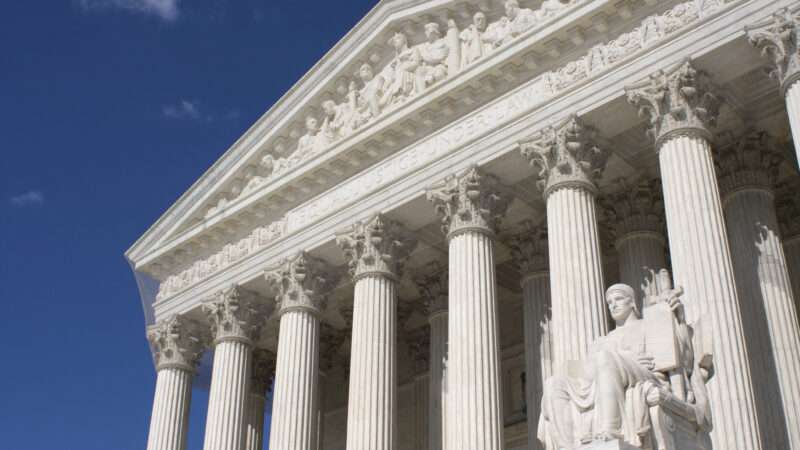Supreme Court Rules No Due Process Right to Preliminary Hearings in Civil Asset Forfeiture Cases

The U.S. Supreme Court ruled Thursday that the due process rights of two Alabama women were not violated when they both had to wait over a year for a court hearing to challenge the police seizure of their cars.
In a 6–3 decision, the Court's conservative majority held in the case Culley v. Marshall, Attorney General of Alabama that property owners in civil asset forfeiture proceedings have no due process right to a preliminary court hearing to determine if police had probable cause to seize their property.
"When police seize and then seek civil forfeiture of a car that was used to commit a drug offense, the Constitution requires a timely forfeiture hearing," Justice Brett Kavanaugh wrote in the majority opinion, joined by Chief Justice John Roberts and Justices Samuel Alito, Clarence Thomas, Neil Gorsuch, and Amy Coney Barrett. "The question here is whether the Constitution also requires a separate preliminary hearing to determine whether the police may retain the car pending the forfeiture hearing. This Court's precedents establish that the answer is no: The Constitution requires a timely forfeiture hearing; the Constitution does not also require a separate preliminary hearing."
Under civil asset forfeiture laws, police can seize property suspected of being connected to criminal activity, even if the owner is never charged or convicted of a crime. Law enforcement groups say it is a vital tool to disrupt drug trafficking and other organized crime.
Civil liberties groups across the political spectrum argue that the process creates perverse profit incentives for police and is unfairly tilted against property owners, who bear the burden of challenging the seizures in court.
Those criticisms have been echoed in the past by not just the Supreme Court's liberal justices but also Justices Clarence Thomas and Neil Gorsuch, giving forfeiture critics hope that a skeptical majority on the Court would clamp down on civil forfeiture.
However, despite writing in a concurrence that "this case leaves many larger questions unresolved about whether, and to what extent, contemporary civil forfeiture practices can be squared with the Constitution's promise of due process," Gorsuch, joined by Thomas, both agreed with the majority opinion.
Today's ruling is a disappointment, then, for groups such as the Institute for Justice, a libertarian-leaning public-interest law firm that filed an amicus brief on behalf of the petitioners. Kirby Thomas West, an Institute for Justice attorney, calls the ruling "a big loss for private property rights."
"Today's decision will mean many more property owners will never get their day in court when it could do them some good—shortly after the seizure of their vehicle or other property," says West. "Instead, civil forfeiture cases will languish for months or years before they are resolved. Meanwhile owners of seized vehicles will scramble to find a way to get to work, take their kids to school, run errands, and complete other essential life tasks."
The Supreme Court agreed to hear the case—two consolidated cases both involving Alabama women whose cars were seized by police for offenses they were not involved or charged with—last year.
In the first case, Halima Culley's son was pulled over by police in Satsuma, Alabama, while driving Culley's car. He was arrested and charged with possession of marijuana and drug paraphernalia. The City of Satsuma also seized Culley's car. It took 20 months, during all of which Culley was bereft of her vehicle, before a state court ruled that she was entitled to the return of her car under Alabama's innocent-owner defense.
In the second case, a friend of Lena Sutton took her car to run an errand in 2019. He was pulled over by police in Leesburg, Alabama, who found methamphetamine in the car and seized it. Sutton also eventually was granted summary judgment on an innocent-owner defense, but not until more than a year after the initial seizure of her car.
Culley and Sutton both filed lawsuits claiming that the towns violated their Eighth and 14th Amendment rights by depriving them of their cars for months when a pretrial hearing to establish probable cause for the seizures could have quickly determined that they were innocent owners.
Those long waits are not unusual. Last year, the U.S. Court of Appeals for the 6th Circuit ruled that Detroit's asset forfeiture scheme violated residents' constitutional rights by making them wait months for court hearings to challenge the validity of seizures. One of the plaintiffs in that lawsuit waited two years for a hearing.
However, the 11th Circuit rejected Culley's claims, finding the state's civil forfeiture process satisfied the requirements for a timely hearing under the speedy trial test, a balancing test created to resolve allegations of Sixth Amendment violations. However, every other circuit that has weighed in on the issue used a different balancing test established in the 1976 Supreme Court case Mathews v. Eldridge to determine due process violations.
The Supreme Court's conservative majority sidestepped the question of which test to use altogether, ruling that the existing requirement for a timely court hearing in forfeiture cases satisfied constitutional requirements.
"A timely forfeiture hearing protects the interests of both the claimant and the government," Kavanaugh wrote. "And an additional preliminary hearing of the kind sought by petitioners would interfere with the government's important law-enforcement activities in the period after the seizure and before the forfeiture hearing."
In a dissent, Justice Sonia Sotomayor, joined by Justices Elena Kagan and Ketanji Brown Jackson, wrote that the majority opinion's reasoning was "deeply flawed" and, rather than resolve the question of which test lower courts should apply, creates a universal rule that "hamstrings federal courts from conducting a context-specific analysis in civil forfeiture schemes that are less generous than the one here."
The post Supreme Court Rules No Due Process Right to Preliminary Hearings in Civil Asset Forfeiture Cases appeared first on Reason.com.
